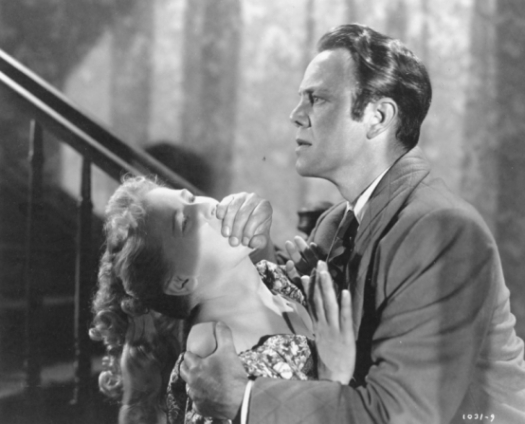Fritz Lang had one of the longest and most unique careers of any German filmmaker to come out of the silents. Unlike some of his fellows, he made the transition from silents to talkies almost seamlessly, mixing the visual aesthetics of silent Expressionism with the possibilities of sound engineering. His German films are all worth seeing – everything from the occasionally bizarre serial Dr. Mabuse: The Gambler to the terrifyingly topical M. His final German film was The Testament of Dr. Mabuse, promptly banned by Goebbels, which stood as Lang’s parting shot before he went to Paris and thence to the States. Lang’s American films are, if possible, weirder than his German ones, as he transposed his visual style and concerns with totalitarianism and psychological drama into the beginnings of film noir. House by the River is an excellent example of his post-war work (which also included the fantastic The Big Heat) and one of the best psychological thrillers ever made.

The film opens with the murder and goes from there. Novelist Stephen Byrne (Louis Hayward) is working at home one day, gets drunk, and tries to assault his maid Emily (Dorothy Patrick). When she struggles and screams, he panics, thinking that their neighbor Mrs. Ambrose (Ann Shoemaker) can hear her. He strangles Emily in an attempt to silence her, and then enlists the help of his brother John (Lee Bowman) to hide the body. The film spirals out from that single event, encompassing Stephen’s desire to flaunt his crime by writing a novel about it, and John’s increasing guilt as the missing Emily becomes the focus of the town’s attention. Meanwhile, Stephen’s wife Marjorie (Jane Wyatt) knows that something is wrong with her husband, but doesn’t yet suspect him of the crime.
House by the River is more than just a period psychological thriller—it delves deeply, and disturbingly, into the psyche of the killer, a man who, once he feels he’s safe, becomes obsessed by his crime. The brothers dump the body in the river that subsequently becomes the focal point of Stephen’s obsession, as he pens a novel called Death by the River that begins to be shaped as a confession. He tortures his brother with their shared crime, shifting between craven begging that John not expose him, and flaunting the murder by lambasting Emily’s character. Lang treats the underlying psychosexual problems with a surprising explicitness—the viewer knows that Stephen attempted to assault Emily, but he paints her as a “loose woman” who stole from him and begins to believe it. The mendacity of the town’s citizens is also thrown into relief—John’s cook and maid recounts how Emily was obviously a “hussy,” and when Stephen begins to cast suspicion on John himself, the town responds with absolute faith in Stephen’s decency and John’s evil. Stephen indulges in fantasies about himself as a great and noble artist who is above the mundane morality of people like his brother and wife, and one point explains to John that it’s fine if John is accused of Emily’s murder, because the world won’t miss him.
While the film occasionally strays into the typical melodrama, with Marjorie worried about her husband’s mental state and a last-act courtroom scene, its strength lies in its expert rendering of psychology externalized. The river in question is photographed in deep chiaroscuro, a repository for all the flotsam of the town, and the lighting in the lead-up to the murder itself makes Stephen’s face into a mask of delighted cruelty. Lang dealt with murderous psychology with greater complexity in M, but here we’re not intended to empathize with Stephen in any way. This a story about a man who commits a murder, gets away with it, and begins to believe that he’s superior as a result. A truly frightening investigation into a killer’s psyche, House by the River is a grotesque pleasure.
House by the River is available to stream on Kanopy and YouTube.
